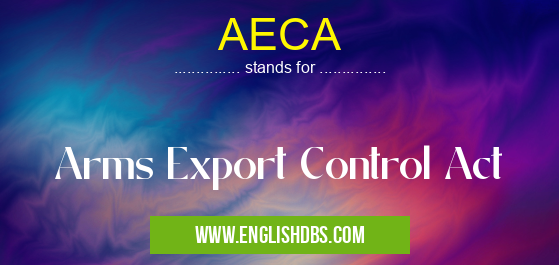What does AECA mean in US GOVERNMENT
The Arms Export Control Act (AECA) is a United States federal law governing the export and import of defense articles, services and technology. Passed in 1976, it replaced the military sales act of 1961 and was later amended to improve controls on the transfer of sensitive items to foreign countries. It provides for both short-term licenses and long-term agreements between the U.S. government and foreign governments for the export of defense items. The Arms Export Control Act also requires that all arms sales be approved by Congress before they can take effect. The goal of this legislation is to ensure that U.S.-made weapons do not enter into regions where they could potentially increase international tensions or be used against their own citizens or those of another country.

AECA meaning in US Government in Governmental
AECA mostly used in an acronym US Government in Category Governmental that means Arms Export Control Act
Shorthand: AECA,
Full Form: Arms Export Control Act
For more information of "Arms Export Control Act", see the section below.
Purpose
The AECA's primary purpose is to control the transfer of defense items from one country to another, as well as between domestic entities, so as to maintain stability throughout the world while still supporting legitimate self-defense efforts by other countries who are United States allies. Through this act, Congress seeks to ensure that U.S.-made weapons do not end up in hostile hands or areas where they could threaten regional security or aggravate existing conflicts. Additionally, AECA encourages mutually beneficial strategic relationships between nations by providing more oversight over international arms deals, saving both financial resources and time by ensuring such deals are conducted quickly and efficiently in accordance with U.S policies and national interests.
Essential Questions and Answers on Arms Export Control Act in "GOVERNMENTAL»USGOV"
What is the Arms Export Control Act?
The Arms Export Control Act (AECA) of 1976 is a federal law that regulates the export and import of defense articles and services. It also authorizes the President to control imports and exports in order to protect national security and foreign policy interests of the United States.
What does AECA regulate?
AECA regulates the export and import of defense articles and services, including munitions, weapons, related technologies, military training, and technical assistance.
Who is responsible for enforcing AECA?
The Department of State's Directorate of Defense Trade Controls (DDTC) is responsible for administering and enforcing AECA.
Is a license required under AECA?
Yes, an export license issued by DDTC is generally required for exports regulated under AECA.
Are there any exceptions to requiring a license under AECA?
Yes, Under certain circumstances an export or import may be exempt from licensing requirements or restrictions. These exemptions are listed in ITAR Part 125 Exemptions from Licensing Requirements.
How long does it take to obtain an authorization under AECA?
The time it takes to obtain an authorization can vary depending on application type and complexity as well as how promptly all requested documents/information are submitted by the applicant. On average processing times for typical applications range from 32-75 days depending on their complexity.
How do I make sure my exports comply with AECA regulations?
One can ensure compliance by taking preventive steps such as conducting proper end-use checks on customers, making sure all parties involved have proper authorization to handle controlled items, verifying that countries involved are not subject to US sanctions before exporting products, creating internal policies with regards to compliance with US export control laws, etc.
Will violations of AECA result in civil penalty or criminal charges?
Violations of AECA may result in both civil penalties or criminal charges depending upon the severity of the violation. Civil penalties may include administrative fines imposed on companies found guilty of violating US export control laws whereas criminal charges could result in prison terms for employees found guilty of knowingly violating US export control laws.
Are there any reporting requirements mandated by AECA?
Yes, exporters must self-report any violations or potential violations that occur within their organization pertaining to the exports regulated by this Act timely and accurately.
Is training available regarding compliance with AECA regulations? Â Â Â Â Â Â Â Â Â Â Â Â Â Â Â Â Â Â Â Â Â Â Â Â Â Â Â Â Â Â Â Â Â Â Â Â Â Â Â Â Â Â Â Â Â Â Â Â Â Â Â Â Â Â Â Â Â Â Â Â Â Â Â Â Â Â Â Â Â Â Â Â Â Â Â Â Â Â Â Â Â Â Â Â Â Â Â Â Â Â Â Â Â Â Â
Yes, there are online training courses available which provide comprehensive overviews on compliance with US export controls such as those administered through the Arms Export Control Act (AEC). Additionally there are workshops held periodically throughout the year focused specifically on arm sales which provide guidance on understanding regulations surrounding arms trade.
Final Words:
In conclusion, the Arms Export Control Act is an important piece of legislation designed to protect both American interests abroad as well as promote stability within our global community through proper regulation of international arms transfers based on rigorous Congressional oversight procedures at all stages of sale/transfer process, from initial licensing requirements through actual product delivery to eventual use by foreign governments or entities associated with them. The AECA remains a symbol of American commitment towards protecting international peace and order through responsible management of our nation's military strength.
